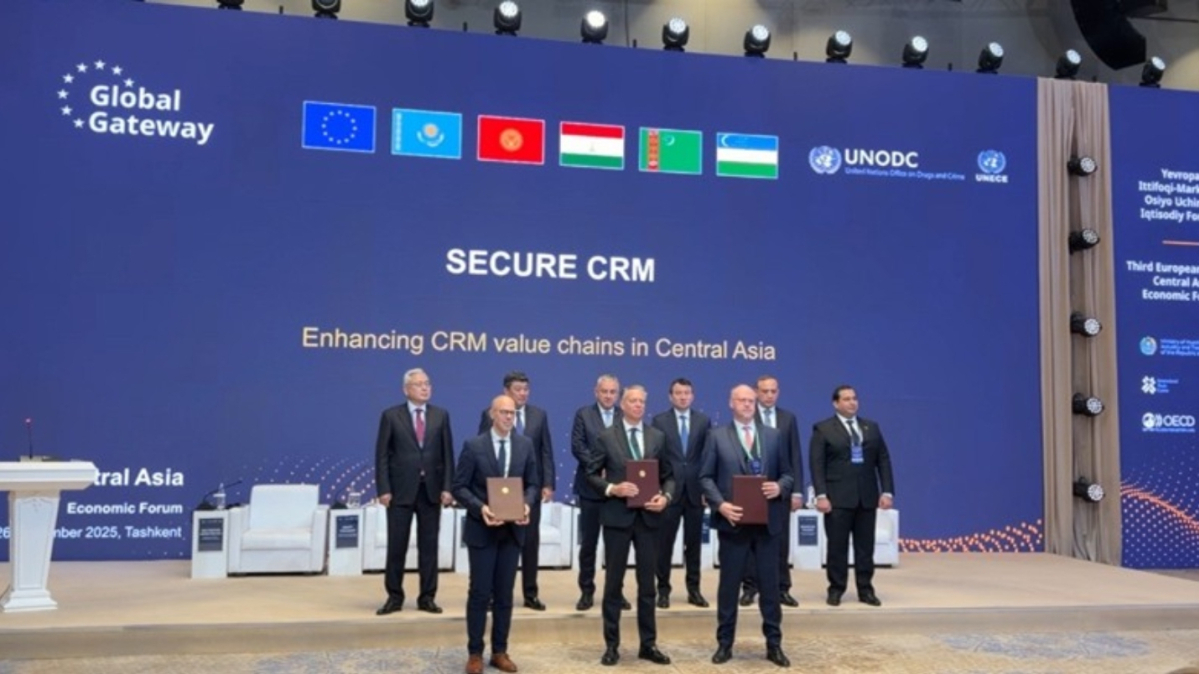Hillary Clinton calls for truth to 'come out' after Epstein testimony
Speaking during a closed-door deposition in New York on Thursday (February), former U.S. Secretary of State Hillary Clinton said she did not “recall...

Uzbekistan is hosting the Third European Union–Central Asia Economic Forum, bringing together government representatives, international organisations and private-sector leaders from 32 countries.
With more than four hundred foreign participants attending, the event reaffirmed the forum’s growing significance as a platform for aligning regional economic priorities and expanding long-term cooperation.
Deputy Prime Minister of Uzbekistan Jamshid Khodjayev said relations between the European Union (EU) and Central Asia continue to demonstrate steady growth and a high level of mutual trust.
According to official figures, trade has quadrupled in the past seven years, reaching €54 billion, while the EU remains the region’s largest investor, providing more than €100 billion in direct investments over the last decade.
Preferential access under the Generalised Scheme of Preferences (GSP and GSP+) has supported export diversification and modernisation efforts across the region.
In 2024, the European Bank for Reconstruction and Development (EBRD) delivered a record $2.26 billion to the region, including $938 million to Uzbekistan alone.
Cooperation with the EBRD, European Investment Bank (EIB) and other institutions, forms a strong basis for infrastructure, social and economic projects in the coming years.
Speaking at the session on enhancing connectivity, Deputy Minister of Investment, Industry and Trade Akram Aliyev underlined the importance of transport modernisation, logistics reform and digital procedures for strengthening competitiveness.
He stressed Uzbekistan’s readiness to deepen partnerships with the private sector and multilateral financial institutions.
EU officials also highlighted the need to improve the business environment to attract long-term investment.
Speaking to AnewZ, Toivo Klaar, the EU Special Representative for the South Caucasus, said:
“The important thing is that we develop the business climate in the Central Asian area so that we have as many European companies come to this region as possible.”
He added that the EU is interested not only in trade, but also in working with partners to develop local industries and skills.
The International Trade Centre (ITC) emphasised the role of small and medium-sized enterprises in unlocking the region’s potential:
Pamela Coke-Hamilton, Executive Director of the ITC told AnewZ that “The region is landlocked, so one of the most important things is the ability to move - and to move quickly.”
She said improved logistics and modern transport routes would help businesses access new markets more efficiently.
The forum covered five thematic areas: fostering prosperity, improving the business and investment climate, developing critical raw materials and sustainable value chains, strengthening professional capacities and deepening regional integration.
Participants discussed practical measures to stimulate investment, expand exports, develop human capital and upgrade infrastructure.
Six bilateral documents were exchanged on the margins of the forum, covering areas such as environmental restoration, irrigation, geodata, value-chain development, regulatory improvements and regional security.
Officials said these agreements reflect the widening scope of practical cooperation.
Uzbekistan–EU relations are now moving towards an expanded strategic partnership, supported by growing trade flows, investor activity and institutional dialogue.
The death toll from heavy rains and flooding in Brazil’s Minas Gerais state has risen to 46, authorities said, with 21 people still reported missing. The storms triggered landslides and widespread flooding, displacing thousands across Juiz de Fora and Uba.
The situation in Cuba was heating up and called for restraint following a deadly incident involving a Florida-registered speedboat off the coast of the Caribbean island, the Kremlin said on Thursday (26 February).
Syria’s economy is showing clear signs of recovery, with economic activity accelerating in recent months, the International Monetary Fund (IMF) said on Wednesday.
The United States has deployed the aircraft carrier USS Gerald R. Ford near Israel as part of a growing military build-up amid tensions with Iran, while governments around the world urge their citizens to leave parts of the region.
Pakistan’s Defence Minister Khawaja Muhammad Asif said on Friday that the country was in an “open war” with neighbouring Afghanistan, declaring that Islamabad’s “cup of patience has overflowed” after overnight clashes in which both sides reported heavy losses.
Iran’s Foreign Minister Abbas Araghchi on Friday urged Afghanistan and Pakistan to resolve their differences through dialogue, offering Tehran’s assistance to facilitate understanding between its eastern neighbours.
Pakistan’s Defence Minister Khawaja Muhammad Asif said on Friday that the country was in an “open war” with neighbouring Afghanistan, declaring that Islamabad’s “cup of patience has overflowed” after overnight clashes in which both sides reported heavy losses.
Ankara has rejected media reports claiming it plans to deploy military forces into Iranian territory in the event of a U.S. attack on the Islamic republic.
Georgia’s path towards European Union membership is facing its most serious crisis to date, with senior European lawmakers warning that the country is now a “candidate in name only” and accusing the ruling government of reversing democratic progress and drifting away from Europe.
As Iran and the United States continue with nuclear talks in Geneva on Thursday, Tehran’s extensive ballistic missile programme remains a central point of contention.
You can download the AnewZ application from Play Store and the App Store.

What is your opinion on this topic?
Leave the first comment